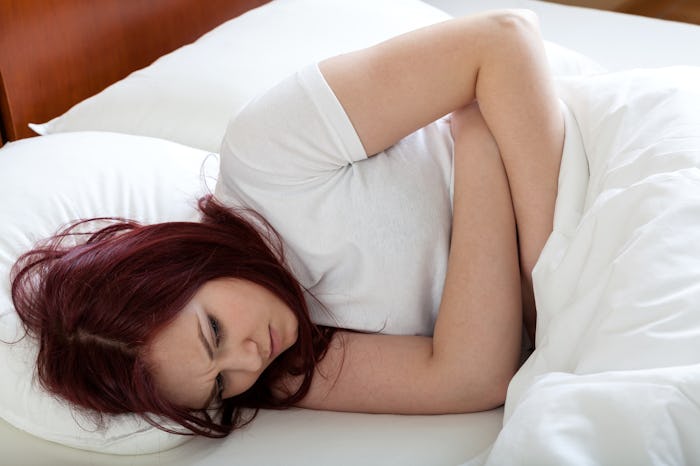Life

9 Reasons You Aren't Getting Your Period, Even Though You Aren't Pregnant
Some women’s periods are dependable, arriving on the same day every month, while others they have cycles that fall outside of the 28-day time frame– if this is you, it doesn’t mean you should necessarily worry. Menstrual cycles can vary each month for a number of reasons. As long as you have a period every month within weeks time of each other, you're probably good. However, if you’re going months without menstruating there are two possibilities: you’re either pregnant, or you’re dealing with one of the many you reasons you aren’t getting your period.
In the grab-basket of reasons why your period has gone missing, some are more serious than others. You could just be super stressed, and need to catch up on some sleep. On the other hand, you could be seeing the first symptoms of polycystic ovarian syndrome.
So, if you start noticing that your period is popping up at random times, that the flow is inconsistent, or that you’ve missed a period or two, you may be suffering from one of these reasons that you don’t get your period. And if that’s the case, you should check in with your gynecologist ASAP, as they’ll be able to pinpoint exactly what's going on with your cycle.
1You Take Antidepressants
Antidepressants and anti-psychotic medications can alter your menstruation cycle, causing you to skip periods or have them more frequently. According to the Hormone Health Network, this happens because antidepressants elevate a pituitary hormone called prolactin, which can alter other hormones in your body that regulate your cycle.
2You've Gained Weight
Everyday Health notes that rapid weight gain can change your hormonal balance. This can cause ovaries to produce extra testosterone and prevent ovulation, which can mean long cycles or no your period at all.
3You Have A Thyroid Disorder
Everyday Health also points out that hypothyroidism an cause irregular or missed periods, as this disease causes a shift in your female hormones.
4You Aren't Sleeping Enough
Looks like getting the right number of Zs affects more than your mood. A 2007 study found that lack of sleep or odd sleep schedules can cause a hormonal imbalance that affects your menstruation.
55.You Have Polycystic Ovarian Syndrome
According to the Office of Women's Health, polycystic ovarian syndrome, or PCOS, is a health problem in which the ovary doesn't make all of the hormones it needs for an egg to fully mature. One of these hormones, progesterone, is necessary to regulate a woman's menstrual cycle, and with PCOS the hormone is irregular or absent.
6You Exercise Too Much
If you've amped up your exercise routine, you may suffer from exercise-induced amenorrhea. But don't let this keep you form regular gym sessions. As Mary Jane Minkin, professor of obstetrics and gynecology at Yale School of Medicine told Self magazine, this only happens when your body fat percentage drops too low. “You need a certain amount of body fat to ovulate, so if your body fat dips too low you may stop ovulating,” she said.
7You Smoke
Looking for another reason to quit your bad habit? According to Huffington Post, cigarettes can kill your eggs, resulting in missed periods and early menopause.
8You Have Diabetes
To Your Health magazine reported that ongoing issues with long, irregular or infrequent menstrual cycles may be linked to insulin resistance and the development of Type 2 diabetes. If you suffer from the disease, it's worth talking to a doctor to see if there are ways to regulate your menstruation.
9You're Period Sharing
What is period sharing, you ask? It's that funny quirk where when you are around another woman, your cycle magically lines up with hers. This phenomenon called 'menstral synchronicity' make explain why your period is late this month.
Images: Photographee.eu/Fotolia; Giphy (9)